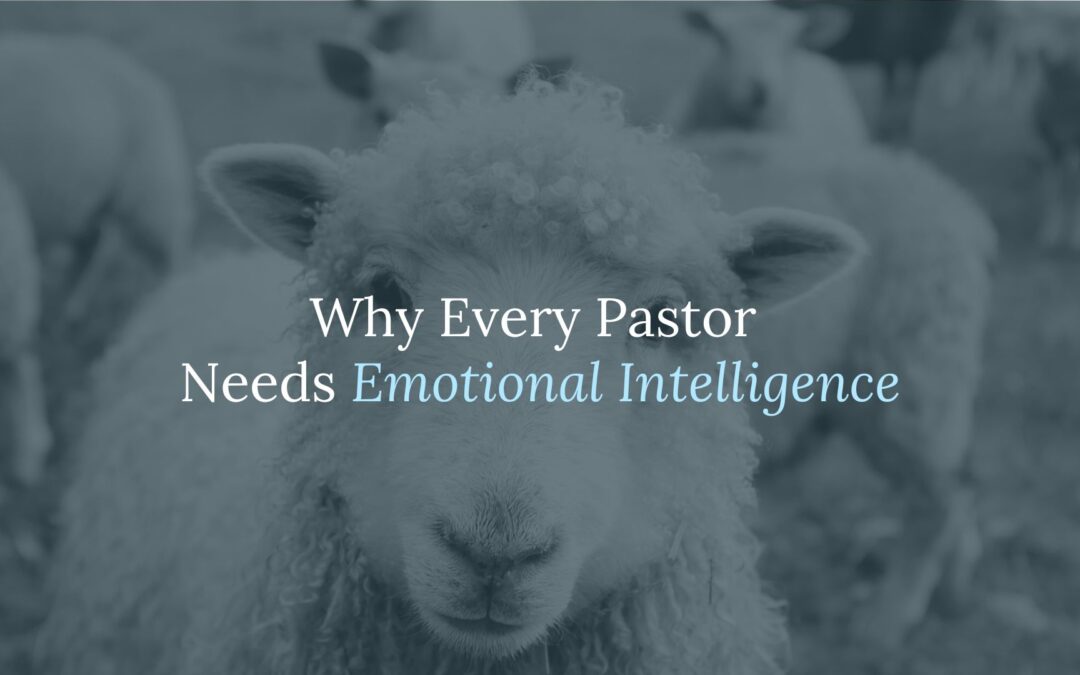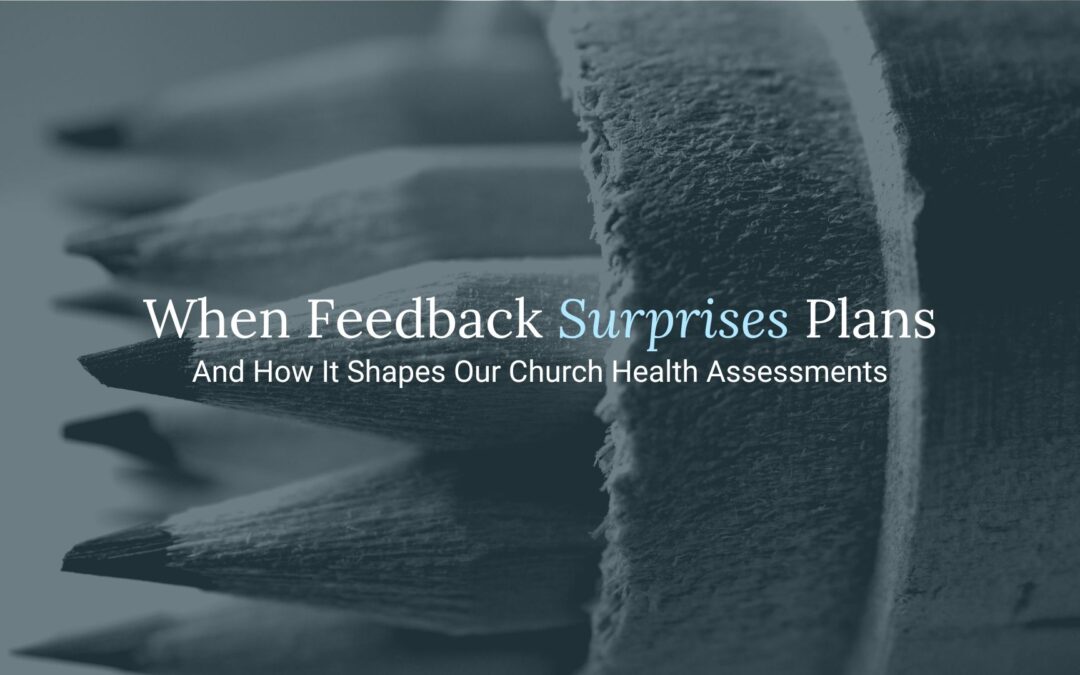
by Stephen Hay | May 23, 2025 | Spiritual Formation, Church Health, Leadership
Ministry leader, may I ask a tender but urgent question?
When was the last time you looked at the people in your congregation and thought, We are stewarding their gifts well?
If you hesitated, you’re not alone. But perhaps more importantly, if we don’t know how to answer that question, we may be missing the means God gave us to build His church.
In a time when attendance feels fragile and volunteers feel few, it’s easy to believe the lie that people aren’t interested in serving. But what if the problem isn’t a lack of willingness, but a lack of clarity?
The Church Isn’t a Stage—It’s a Body
The Apostle Paul reminds us: “Now there are varieties of gifts, but the same Spirit… to each is given the manifestation of the Spirit for the common good.” (1 Corinthians 12:4,7)
Note Paul’s words: to each is given.
There is no Christian on the sidelines of God’s mission—unless we put them there. The Holy Spirit has assigned gifts to every believer, not just for their fulfillment, but for the strengthening of the whole church. When we fail to help people identify and activate those gifts, we cut off the supply chain of the Spirit’s power meant to flow through His people.
This is not just bad leadership—it’s poor stewardship.
We Don’t Have a Volunteer Shortage—We Have a Vision Shortfall
Consider this:
85% of born-again adults have heard of spiritual gifts.
Yet nearly half, 46%, say they don’t know what their gift is, or believe they don’t have one at all.
And even among those who claim to know, only 30% can identify a biblically rooted gift. The rest either misidentify personality traits as gifts or can’t describe how their gifts are being used in the church today.
These aren’t stats to shrug at. They are a flashing warning that we’ve taught church membership without discipleship, and celebrated involvement without discernment.
Gift Awareness Fuels Spiritual Growth
Let me encourage you with this: helping people understand and deploy their spiritual gifts is not a leadership tactic—it’s a discipleship practice.
When believers are given language for how God has wired them, they begin to walk with fresh confidence in their identity in Christ. In fact, 82% of self-identifying Christians say that developing their gifts draws them closer to God. Among practicing Christians, that number rises to 97%.
Can you see the beauty? Teaching gifts don’t just get people into service—they get them deeper into Christ.
Gift Clarity Builds the Church (and Prevents Burnout)
Here’s what pastors often miss: when we fail to identify gifts, we default to filling holes. The most eager volunteers tend to receive the most tasks. Those who aren’t upfront or outspoken get overlooked. And we silently assume that “availability” is the same as “anointing.”
But what if, instead, we took time to discover who God has already placed in the room?
What if we said: No one does everything, but everyone does something. And we will help you find that something.
Churches that teach and deploy spiritual gifts experience up to a 35% greater retention of volunteers. They grow more sustainably. And more importantly, they bear fruit that lasts.
Pastor, Start With Yourself
Before you go searching your congregation for gifts, ask yourself: Do I know my own?
Your ability to lead with clarity depends on knowing how the Spirit has equipped you, not just as a shepherd, but as a part of the body. Knowing your gift mix humbles you, keeps you from over-functioning, and frees you to make space for others to lead.
Let the work begin with you. Then create a culture where others can follow.
Next Steps, Not Guilt Trips
This isn’t a call to do more—it’s a call to see differently. The Spirit has already done the heavy lifting. You’re simply called to steward the gifts He’s entrusted to your flock.
So ask the questions:
- Do we teach about spiritual gifts with biblical clarity?
- Do we help people discover and discuss their gifting?
- Do our ministries align with the gifts God has actually given?
- Do our people feel celebrated and developed, or just used?
Because if every member has been gifted for the common good, then the church has already been equipped to flourish.
We just need to unearth what’s been buried.
And then—by God’s grace—fan it into flame.

by Stephen Hay | May 23, 2025 | Leadership, Spiritual Formation
Because the Heart Can’t Shepherd What It Can’t See
“Keep watch over yourselves…”
Before Paul says “and all the flock,” he says yourselves.
Acts 20:28 isn’t subtle. And yet, how many of us in ministry have spent years watching the sheep, but not our souls?
We prepare sermons and lead meetings, cast vision and resolve conflict, all while ignoring the emotional dashboard that’s quietly blinking ‘overload.’ Or worse—numb.
And here’s what we know, if we’re honest:
We’ve mastered the art of appearing unshakeable… even when we’re spiritually and emotionally threadbare.
That’s where Emotional Intelligence (EQ) comes in—not as a buzzword, but as a biblical tool.
What Is EQ—and Why Should Pastors Care?
Emotional Intelligence is the ability to recognize, understand, and manage your own emotions—and the emotions of those around you. It isn’t sentimentality. It’s soul-wisdom in real time.
In modern terms, EQ includes five key areas:
- Self-awareness
- Self-regulation
- Motivation
- Empathy
- Social skills
In biblical terms? It bears a strong resemblance to the fruit of the Spirit. It sounds like James: “Be quick to listen, slow to speak, slow to become angry.” It smells like Christ.
The Data Is Clear: EQ Is Ministry Survival Gear
Let me show you just how critical EQ is for pastoral leadership:
- Burnout is on the rise. Over 40% of pastors are now at high risk—up 400% since 2015. But research shows that pastors with high EQ experience far lower burnout across every measure.
- Leadership effectiveness increases. One study of executive pastors showed that EQ alone explained 42% of their perceived effectiveness. That’s nearly half.
- Conflict is handled better. Emotional intelligence equips us not to avoid conflict (a temptation in ministry), but to transform it—through empathy, regulation, and wise timing.
- Job satisfaction and team morale rise. EQ doesn’t just change how you feel—it shapes how your entire staff team functions, collaborates, and grows.
- Christ-like leadership becomes visible. Congregations don’t follow charisma—they follow character. Emotional maturity isn’t optional for a shepherd. It’s essential.
The Gospel Requires a Self-Aware Shepherd
We are not called to be perfect, but we are called to be present—to ourselves, to our people, and to the Lord.
Jesus knew His emotional state. He wept. He grieved. He rejoiced. He questioned in the garden and showed compassion in the crowd. He lived with a holy awareness, even in the midst of anguish. So must we.
As pastors, we are not exempt from the need for emotional growth. We are stewards of it.
To know God more deeply is to know ourselves more clearly—not to obsess over our feelings, but to recognize that unacknowledged emotions don’t disappear; they disciple us in the dark.
Five Questions Every Pastor Should Ask:
- When was the last time I named what I was feeling, without spiritualizing it?
- Do I know how my mood shapes the tone of our meetings or sermons?
- Can I listen to criticism without spiraling or retaliating?
- Do I sense emotional shifts in others, or only react when it’s “too late”?
- Am I modeling emotional maturity for my staff, family, and church body?
This Is Discipleship, Too
Let’s stop calling it “soft skills.” Emotional Intelligence is spiritual formation. It is leadership fidelity. It is how we shepherd hearts, starting with our own.
So, to my fellow pastors and ministry leaders:
Don’t wait for a breakdown to start paying attention to your inner life.
Don’t assume high theology cancels out low awareness.
And don’t believe the lie that burnout is a badge of honor.
Start today. Be honest with yourself. Ask your spouse. Take the Emotional Intelligence assessment. Find a coach. Read the Psalms with fresh eyes—not just for inspiration, but for instruction.
We are not merely sermon-deliverers. We are soul-shepherds.
And the best shepherds know when their own soul needs tending, too.
Let the gospel shape you—emotionally, relationally, and deeply.
Because the health of the church often reflects the health of its shepherd.
And healing always starts with honesty.
“Above all else, guard your heart, for everything you do flows from it.”
— Proverbs 4:23

by Stephen Hay | May 23, 2025 | Church Health, Cultural Trends, Leadership
Because the gospel doesn’t segregate what Christ came to reconcile.
Ministry Leader, Let’s Talk About the People You Don’t See
You know your congregation. You could list the regulars by name. You know who makes the coffee, who sits in the back row, and which teen has started bringing their Bible or which one is always on their phone. But here’s the more searching question: do you know the family two doors down who’s never once come through your doors?
And more importantly, does your church look like them?
Scripture is clear: the gospel of Jesus is for every tribe, tongue, and nation. However, many of our churches today operate more like spiritual echo chambers than missionary outposts. Our pews remain safe, familiar, and homogenous—even when our neighborhoods don’t.
We’re not called to curate community; we’re called to embody the kingdom. And the kingdom has always been a kaleidoscope.
The Bible Doesn’t Whisper About Diversity
When Paul wrote to the Ephesians, he didn’t suggest that Jews and Gentiles might consider having a potluck together. He proclaimed something far more radical:
“He himself is our peace… who has broken down in his flesh the dividing wall of hostility.” (Eph. 2:14)
The gospel didn’t merely save individuals; it built a new people. A reconciled family. A body where every part, no matter how different, belongs to the same Head. And that means a local church that refuses to cross cultural, ethnic, or socio-economic lines is not just missing a strategic opportunity—it’s missing a theological one.
What the Data Confirms About Kingdom Diversity
This isn’t just a biblical principle—it’s backed by measurable realities. In fact:
- Racially diverse churches grow faster and sustain higher attendance over time. A 20-year Baylor study of over 20,000 Methodist congregations confirmed it.
- Multiracial congregations report stronger spiritual vitality, clearer mission, and deeper community engagement, according to the 2020 Faith Communities Today (FACT) survey.
- Yet still, 66% of American churchgoers attend a church where nearly everyone looks like them (Pew 2025).
We’re preaching reconciliation while remaining segregated by default.
What message does that send to the neighbor whose accent, skin tone, or story doesn’t match the majority in our pews? What does it say to the child being raised in a multicultural household who never sees that reality mirrored in her Sunday school room?
Diversity Isn’t a Trend—It’s a Test of Discipleship
Let’s be clear: reflecting our community isn’t a cosmetic fix. This isn’t about inclusion for appearance’s sake. This is about obedience.
When Jesus prayed in John 17, He didn’t just pray for unity among those who already had it. He prayed for a future church—a gathered people whose love for one another would authenticate His message to the watching world.
That kind of love costs something. It requires:
- Listening to the voices you haven’t heard.
- Platforming leaders who represent the diversity of your city.
- Repenting of comfort when it has become a barrier to connection.
The path to a multi-ethnic, multi-class, multi-generational church is paved with self-denial and Spirit-dependence. But it’s also paved with joy.
The Church That Mirrors Its Neighborhood Ministers to It
When your church starts to reflect your ZIP code, something beautiful happens:
- You understand the unspoken fears of your neighbors.
- You pray more specifically for their burdens.
- You learn to serve not from a distance, but from across the table.
You gain credibility, empathy, and spiritual insight—not because you’ve built a program, but because you’ve become a people.
Barna’s 2023 study found urban churches that mirrored their neighborhoods were nearly twice as likely to report deep understanding of local needs. That’s not surprising. Representation builds resonance. And resonance leads to real ministry.
Start With What You See—and Who You Don’t
Ministry leader, take a walk through your neighborhood this week. Really see it. Take a slow lap around the nearest school building. Watch who gathers in the local park. Then ask yourself honestly:
“If my church disappeared tomorrow, who would notice?”
If your answer is “only the people inside the walls,” then you don’t need a new program—you need a new posture. One of humility. Of invitation. Of alignment with the One who broke every barrier, starting with the one that separated you from God.
We Reflect Christ Best When We Don’t All Look the Same
The book of Revelation ends with a picture of perfect worship. But it doesn’t center on sameness. It centers on diverse unity—every tribe, tongue, and nation worshiping the Lamb. That’s not just a heavenly vision. That’s our present mandate.
Let’s lead churches that give our cities a preview of that glory.
Let’s build communities so blended that they can only be explained by grace.
Let’s make it normal to say, “This church looks like my community.”
And may our neighborhoods say in wonder, “We didn’t know church could look like this.”

by Stephen Hay | Apr 28, 2025 | Church Health, Conflict, Leadership
And How It Shapes Our Church Health Assessments
I had the perfect plan.
Color-coded. Carefully budgeted. The perfect five-month rollout that tied together leadership development, discipleship groups, and even a new volunteer onboarding pathway. I had charts. I had buy-in. I had the whole thing laid out like a well-prayed-over blueprint.
And then it unraveled—beautifully.
Not in a catastrophe, but in the way that only real ministry can undo you. A new believer asked a question I couldn’t answer. A seasoned leader quietly confessed he didn’t feel equipped to lead anymore. A team that looked solid on the outside was quietly struggling on the inside.
None of these realities had a column in my spreadsheet.
The Myth That “More Planning” Fixes Everything
For most of my ministry life, I operated under the quiet assumption that the better my planning, the better the outcomes. Tight timelines, clear expectations, detailed to-do lists—these were the hallmarks of “faithful stewardship” in my mind.
And don’t get me wrong: planning is a form of stewardship.
But over time, I started to see the cracks.
Because ministry isn’t a machine—it’s a garden.
And people aren’t programs—they’re living, breathing souls.
No matter how much data you gather or how well you design your strategy, people don’t always behave according to the plan. And that’s not a failure. That’s ministry.
Why Our Approach to Church Health Assessments Looks Unique
That realization changed not just my philosophy—it shaped how we now approach strategic implementation for every Church Health Assessment we offer.
When a church team partners with us, we start with a robust map:
- We gather extensive data.
- We analyze patterns.
- We identify clear pathways for growth.
The plan is real, intentional, and based on real evidence.
But—and this is critical—we plan in pencil.
Because we know:
Churches are not binary systems.
People aren’t predictable formulas.
Ministry demands flexibility because the Spirit moves in living hearts, not flowcharts.
That’s why when we walk alongside an implementation team, we don’t just drop a static action plan and walk away. We build feedback loops right into the process. Regular check-ins. Team reflections. Space for discernment. Flexibility to pivot when real life demands it.
We steward the data seriously—but we steward the people even more seriously.
How Feedback Makes the Plan Stronger
If there’s one thing we’ve learned, it’s this:
Plans give you a direction. Feedback gives you discernment.
Our strategic implementation model lives in the tension between the two.
We don’t swing to either extreme:
- We don’t throw out planning and “wing it”—that would be unfaithful.
- But we also don’t cling to a rigid plan so tightly that we miss what God is actually doing on the ground.
Instead, we move forward wisely, intentionally, but with open hands.
We ask key leaders reflective questions along the way.
We revisit strategies based on new realities.
And through it all, we remind ourselves: the goal isn’t to stick to the original map at all costs.
The goal is health. Growth. Flourishing. Gospel movement.
And those things don’t always follow our timetables.
Ministry Leaders, Here’s What I Hope You Hear
You don’t have to stop planning.
You don’t have to distrust data.
You don’t have to feel like needing to adjust means you did something wrong.
But I encourage you—whether you’re navigating a Church Health Assessment implementation or just stewarding the daily life of your church:
Plan in pencil.
Leave room for grace, for feedback, for surprising growth.
Because in ministry, faithfulness isn’t measured by how closely we stick to the original plan.
It’s measured by how closely we follow the Spirit’s leading—step by faithful step.
If your church is entering a season of strategic reflection or feeling the need for a fresh, Spirit-sensitive pathway toward health, we would be honored to walk that road with you, with a real plan, real flexibility, and a deep respect for the people God has entrusted to you.

by Stephen Hay | Apr 25, 2025 | Spiritual Formation, Leadership
I used to think stress was the enemy.
Like many pastors, I assumed that when my chest tightened and my to-do list felt like it had teeth, I was somehow doing it wrong—living outside God’s best, missing some secret formula for “peace that surpasses understanding.” Stress, I believed, was a neon sign flashing Failure! over my life.
But recently, I learned something that turned that assumption upside down.
I stumbled across the difference between distress and eustress—two words that describe two very different stories that stress can tell. It was Hans Selye, a scientist in the 1970s, who first named them. Distress is the story most of us know: the grinding, overwhelming kind of stress that erodes hope and health. But eustress (from the Greek word for “good”) is a different tale altogether—it’s the energizing, growth-stretching kind of stress that actually strengthens you.
It hit me hard:
Stress isn’t always the enemy. Misinterpreted stress is.
A Different Kind of Fight
As I dug deeper, I learned that the key difference between distress and eustress isn’t the size of the problem. It’s the way our hearts appraise it.
When a challenge feels bigger than our resources, it mutates into distress. But when a challenge feels just within reach, it sparks eustress—fueling learning, resilience, even joy. In God’s kindness, our bodies are wired to handle both—but they thrive when we name the story rightly.
And here’s where it got personal.
I thought about the new ministry initiatives we were launching—the way excitement had so quickly soured into sleepless nights, tangled in what-ifs and worst-case scenarios. Distress had been gnawing at me, not because the task was inherently bad, but because somewhere along the way, I had lost the perspective that God equips those He calls. I had stopped seeing the opportunity and only saw the threat.
Choosing to Reframe
One small but profound practice I’ve started since is learning to reframe stressful situations intentionally—right there in the moment. When a heavy meeting or a tight sermon deadline looms, I now ask myself:
“Is this a threat—or a stretch?”
“Is God exposing my weakness to shame me—or inviting me to trust Him for more?”
It’s startling how often my gut response changes. What once felt like distress now feels more like holy eustress—a chance to lean harder on the Spirit and discover new muscles I didn’t know I had.
I also started building small recovery rhythms into my days: pausing for prayer after long meetings, taking five-minute walks between writing sprints, practicing actual Sabbath instead of “crash-and-binge” days off. Those tiny margins aren’t indulgences. They are what allow eustress to sharpen me without tipping into burnout.
A Takeaway for the Weary Leader
If you’re reading this, weighed down under the demands of ministry, let me remind you:
Stress is not a sign you’re failing. It may be the sign you’re growing.
The enemy would love to convince you that every heavy moment is a sentence of doom. But Scripture reminds us:
“We are hard pressed on every side, but not crushed; perplexed, but not in despair…” (2 Corinthians 4:8)
In Christ, even our pressure points become places of renewal.
The challenge is not to eliminate stress (an impossible goal) but to rightly interpret it—to ask what kind of story it’s telling, and who’s holding the pen.
So the next time your heart races before you step into a hard conversation, or your mind spins with deadlines and sermons and counseling appointments, pause. Take a breath. Name the moment:
“This isn’t a threat. It’s an invitation.”
And walk forward with hope.
God is not just the God of peace in our stillness.
He is the God of strength in our striving.
And remarkably, He uses even the pressures of ministry—not to crush us—but to carve us more fully into the likeness of Christ.
May we be those who see God’s hand even in the weight, and who trust that in every pressure, He is making us more like His Son.

by Stephen Hay | Mar 13, 2025 | Leadership
We don’t often speak about pastoral succession in our churches — not in the way we need to.
We might allude to it in elder meetings or crack a nervous joke about “preaching until we drop,” but rarely do we treat it as the serious, spiritual responsibility that it is. And yet, leadership transitions are not an if but a when. We will all, eventually, step aside.
Recently, I read a doctoral thesis that offered a gentle but urgent nudge. It wasn’t loud or dramatic. It was thoughtful and quietly convicting — the kind of writing that does what God’s Word so often does: lays us bare and builds us up.
Among its many insights, one rose to the surface like a truth I already knew but hadn’t dared say out loud: to lead well is to prepare others to lead after you.
Leadership Isn’t a Lifetime Appointment
There’s a sacredness to pastoral leadership — and with that comes a temptation to treat the role as something permanent. But biblically speaking, leadership is a season, not a possession.
The research I reviewed pointed to a compelling statistic: 84% of churches in America lack a written succession plan for their senior pastor (Vanderbloemen & Bird, Next: Pastoral Succession That Works). Let that sit with you for a moment.
Eighty-four percent.
That means most churches are unprepared for the inevitable — be it retirement, illness, moral failure, or the quiet nudge of the Holy Spirit calling a pastor to a new season. The absence of a plan is rarely out of apathy. More often, it’s out of discomfort. But faithfulness invites us into discomfort when it’s required for the flourishing of God’s people.
The “Moses Effect” — And the Cost of Delay
The thesis described a leadership pattern called the “Moses Effect.” It refers to faithful pastors who lead well for decades but remain in their role long past the season of fruitfulness — often without training a successor.
The image is compelling: Moses led the people out of Egypt, but Joshua led them into the Promised Land. God’s purposes required both. And for the transition to work, the baton had to be passed intentionally.
We are not Moses forever. We are stewards for a time. The question is: will we raise up Joshua while we still can?
Succession Planning Is Spiritual Formation
Succession is not just a leadership issue — it is a discipleship issue. It is the natural extension of what Jesus modeled.
Jesus didn’t just preach the kingdom. He prepared people to preach after Him.
He empowered His disciples. He equipped them. And — maybe most counterintuitively — He left. He did not cling to His earthly ministry. He completed it, and in doing so, gave it away.
To prepare a successor is to say with our lives what we preach with our lips: This ministry was never mine to begin with. It belongs to God, and He will raise up the next shepherd, just as He raised up me.
Why We Delay (and Why We Can’t)
So why don’t churches plan?
The research uncovered familiar obstacles: fear of financial insecurity, emotional attachment to the role, fear of irrelevance, and, perhaps most deeply, the absence of a vision for what comes next.
As a consultant, I’ve seen this up close. Churches hope the conversation will wait until a better time — after Easter, after the budget is settled, after this next hire. But succession planning is never urgent until it’s too urgent.
The longer we wait, the more we risk:
- Leadership confusion
- Loss of trust
- Congregational division
- Ministry decline
Planning doesn’t weaken your leadership. It strengthens your legacy.
A Better Way Forward
You don’t need a retirement date on the calendar to begin thinking about succession.
Here’s what you do need:
- The humility to admit your season has limits.
- The courage to ask who God might be raising up.
- The wisdom to involve others in the process.
- The love to leave well — not for your sake, but for theirs.
Because a leader who loves their people prepares them not just for this season, but for the next.
One Takeaway for All of Us
Successions are not about endings, but about endurance.
It is the quiet, courageous work of ensuring the Church continues — not on your shoulders, but on the shoulders of those you’ve discipled, mentored, prayed for, and released.
We are not called to be the cornerstone. We are called to build faithfully upon it.
So whether you’re a lead pastor, a board member, or someone serving behind the scenes, consider this an invitation: to begin the conversation, to trust the Spirit’s timing, and to believe that what God started through you, He will continue — through someone else.
Because the true measure of leadership is not what we keep. It’s what we leave.






